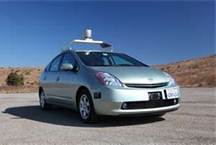Consumers Looking for Safety in Self-Driving Cars, Even at a Premium Price
 |
PITTSBURGH -- January 30, 2015: Auto manufacturers are accelerating self-driving car technology like never before to help eliminate human errors that cause most accidents – a safety benefit that is not lost on consumers according to a recent study. A survey conducted by the College of Engineering at Carnegie Mellon University, the University that has been the pioneer of autonomous vehicle technology, lists 10 situations that people believe will be less hazardous with self-driving cars:
Top 10 Safer Scenarios Thanks to Self-driving Cars
1. Night driving
2. Unfamiliar areas and roads
3. Congested roads
4. Bad snowstorms
5. Merging traffic situations
6. Interstate travel
7. City taxi
8. Daytime driving
9. School bus
10. Running errands
With safety in mind, the respondents wanted additional features in autonomous vehicles, including driver fatigue warnings (57%) and parental controls to set speed limit, curfew time and number of passengers in the car (83%).
The survey explored consumers’ interest in buying self-driving vehicles and their safety attributes. The majority of respondents (70%) said they wouldn’t buy a car with self-driving capability if it cost 30 percent more than a comparable car without it. However, nearly a third of respondents (30%) were willing to pay 30 percent more for an autonomous vehicle suggesting there’s substantial demand, despite the greater cost. Millennials were the most willing to pay a premium price, indicating that they may be early adopters of these vehicles. Men (29%) and women (28%) were similar in their willingness to spend more for an autonomous car.
Aware that market factors will influence public adoption of self-driving cars, researchers in College of Engineering intend to make self-driving cars affordable by developing technologies that can be used now and upgraded later as new features emerge. Carnegie Mellon, the birthplace of autonomous vehicle (AV) technology, has a 30-year history of advancing self-driving car technology for commercialization.
About the survey: The college polled 1,000 people in the United States between the ages of 18 – 70 to gain insight into what consumers are looking for in self-driving cars. In the survey, a self-driving car was defined as having sensors and computing technology that allows the car to safely travel without a driver controlling the steering wheel, gas and brake pedal. The vehicle would automatically move at safe speeds, keep a safe distance from surrounding cars, change traffic lanes, obey traffic signals and follow GPS directions to destinations.


